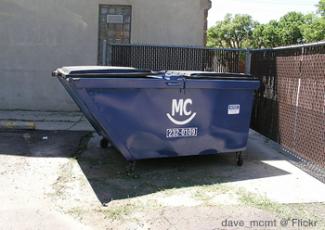At your Business
Businesses can make small, low-cost changes to reduce stormwater pollution.
If your business uses a dumpster, loading dock, hazardous materials or simply a parking lot, it is a candidate for improving stormwater pollution prevention practices. It’s easy to make small, low-cost changes that will have a big impact on stopping stormwater pollution. And, because businesses offer a public face to the community, your efforts will help lead your community towards better stormwater management.
Complete a Self-Inspection
- Use our business self-inspection checklist for a list of stormwater pollution prevention practices that can help your business keep pollution out of our waters and stay in compliance with local stormwater regulations.
Eliminate Illicit Discharges

- Eliminating connections to storm sewers is a critical step to ensuring that your business isn’t contributing to stormwater pollution.
- Check to ensure that you do not have connections that discharge to a storm drain. If you do, arrange for disconnection.
Manage Hazardous Materials
- Examples of hazardous materials include process chemicals, pesticides, herbicides, cleaning materials, waste materials, oil, and gasoline.
- Store hazardous materials inside or under cover to keep them out of the rain and snow, and away from any location where leaks could get into storm drains or waterways (e.g. near sump pumps).
- We recommend storing hazardous materials in a secondary containment system large enough to contain the material if the container began to leak. This can be as simple as putting materials in a bucket or basin.
- Make a current spill response plan and train employees so that they are familiar with it.
- Keep “dry” cleaning materials such as a broom, mop, saw dust, or kitty litter available for cleaning up spills. Do not use water to rinse off a spill.
Keep Up With Good Housekeeping
- Ensure that dumpsters remain covered and leak-proof. Locate dumpsters away from storm drains, and keep the drain plugs in.
- Use a mop sink for cleaning floor mats and equipment. Pour wash water in the sink, not outside.
- Wash vehicles at a commercial car wash. If you must wash vehicles or equipment outdoors, use water only, not soap, wash on grassy areas, and divert water from stormdrains.
- Keep parking lot and service areas clean. Provide trash bins and empty them regularly. Divert water from loading docks.
- Keep wetlands and shoreline areas clean and in natural condition. Whenever possible, allow vegetation to grow into a natural buffer instead of mowing to wetland edges.
- Water wisely and limit fertilizer use. Consider replacing some lawn area with low-maintenance plantings.
Control Soil Erosion and Sediment
- Visit our Soil Erosion and Sediment Control page to learn more about how to prevent pollution from land-disturbing activities.
